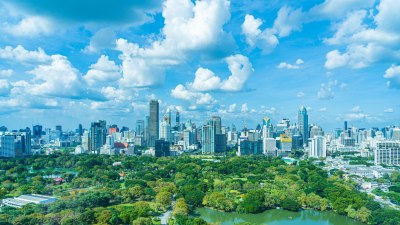How Travel Reminds Us That There’s Always More to Learn
Discover how travel can enhance our understanding of the world and promote lifelong learning.

Image by marymarkevich on Freepik
Travel has always been a gateway to discovery, pushing individuals out of their comfort zones and into new environments. In an age when information is at our fingertips, the experiential learning that comes from travel is more valuable than ever. This article aims to explore how travel reminds us that there’s always more to learn.
The Human Connection
When you travel, you meet people from diverse backgrounds, cultures, and lifestyles. This interaction can shift your perspective significantly. For instance, spending time with locals can provide insights into their customs, values, and traditions that cannot be captured through books or documentaries. Understanding cultural nuances, including language intricacies, historical contexts, and social norms, reveals a more profound truth about human connections. Whether it's sharing a meal, participating in a local festival, or simply conversing in a café, these interactions enrich your worldview and foster empathy.
Learning Through Challenges
Travel often comes with unexpected challenges. Delayed flights, language barriers, or unfamiliar transportation systems can test your problem-solving skills. Each hurdle presents an opportunity to learn something new. For example, a missed train might lead you to discover a hidden gem in the city you are exploring. Overcoming challenges enhances your resilience and adaptability, skills that are valuable in all aspects of life. The ability to navigate an unfamiliar environment reinforces confidence and encourages a willingness to embrace the unknown.
Geography and History Lessons
Visiting historical landmarks or geographical wonders can be a powerful way to grasp concepts that seem abstract in school. Standing in front of the Colosseum in Rome or gazing at the Great Wall of China sparks an appreciation for history that textbooks cannot replicate. Walking through ancient ruins or experiencing natural phenomena can ignite curiosity about how these places were formed and the stories they carry. History becomes tangible, and geography transforms from lines on a map into something profoundly significant.
Exposure to New Ideas
New environments are fertile ground for ideas. Traveling often means stepping outside your usual bubble, leading to creative thoughts and innovative problem-solving. Different cultures approach challenges differently; exposure to these alternatives can inspire fresh solutions. For instance, traveling to Scandinavian countries may introduce you to progressive approaches to sustainability, while visiting Japan could cultivate a deeper appreciation for minimalism and efficiency. Thus, travel acts as a catalyst for personal and professional growth, broadening our mental and emotional horizons.
Culinary Education
Food is an integral part of culture, and traveling provides an opportunity to dive deep into culinary traditions. Tasting local dishes and learning about the ingredients and cooking methods can be an enlightening experience. For example, cooking classes in Thailand reveal the importance of balance in flavors, while street food tours in Mexico educate you on the region's history through its open-air markets. Culinary experiences enhance not just our palates but also our understanding of cultural significance and agricultural practices.
The Wisdom of Nature
Many travelers seek the serene beauty of nature, whether hiking in the mountains or lounging on a tropical beach. Nature teaches valuable lessons about conservation, respect, and the interconnectedness of all life forms. While trekking through a national park, one might contemplate environmental issues and the importance of preserving natural habitats. The experience can deepen one's sense of responsibility toward the planet, prompting research into ecological issues and inspiring proactive changes in our lifestyles.
Mindfulness and Presence
In our fast-paced lives, travel often serves as a reminder to slow down and be present. Exploring a new city requires focus: noticing intricate details in architecture, absorbing the sounds of local life, or savoring the taste of local cuisine. This mindfulness can create lasting memories and foster a more profound appreciation for experiences. By witnessing beauty firsthand, rather than through pixelated screens, travelers can cultivate gratitude and enrich their souls.
Personal Growth
Traveling frequents personal growth, as it challenges preconceived notions and encourages introspection. Being away from home can lead to revelations about who you are and what you value. Solo travel, in particular, encourages self-reflection, as you navigate unfamiliar territories alone, presenting the perfect scenario for personal development. This newfound awareness often translates into a more profound understanding of one's goals and priorities back home.
Understanding Global Issues
Visiting different countries can provide real-world exposure to global issues, such as poverty, climate change, and inequality. Observing these challenges firsthand can be eye-opening and compel travelers to consider their roles in a global society. It cultivates informed citizens who are more likely to engage in discussions about social justice, environmental sustainability, and global responsibility. Traveling can serve as a reminder that while disparities exist, so do solutions and initiatives that deserve attention and support.
Cultural Competence and Sensitivity
In an increasingly interconnected world, the importance of cultural competence cannot be overstated. Traveling fosters awareness of cultural similarities and differences, promoting understanding and tolerance. When you immerse yourself in another culture, you learn to appreciate diversity, ultimately encouraging more respectful interactions back home. As travel teaches us about respecting space and customs, it builds bridges that can counteract prejudice and misunderstanding. This cultural sensitivity equips travelers to participate meaningfully in a globalized society.
The Ripple Effect of Knowledge Sharing
Travel is not just about receiving knowledge; it also involves sharing our experiences with others. Upon returning home, travelers often become advocates for cultural exchange, sharing stories, food, and ideas with friends and family. This knowledge-sharing creates a ripple effect, inspiring others to travel, learn, and grow. Whether through a casual conversation or hosting a cooking night, travelers can ignite curiosity in others, fostering a community that values learning.
Continuous Learning Beyond the Journey
The lessons learned through travel do not end when the journey does. The desire to learn and grow continues long after you return home. Many travelers find themselves drawn to books, documentaries, and courses related to the cultures they've experienced. This pursuit of knowledge leads to a richer understanding of the world and a commitment to lifelong learning. The insights gained during travels often serve as catalysts for new interests and passions, ensuring that the journey doesn't stop when the plane lands.
Travel is a lifelong classroom that reminds us there’s always more to learn. It challenges us, exposes us to new ideas, and cultivates a spirit of curiosity that can last a lifetime. As we connect with different cultures, confront personal challenges, and absorb the beauty of our planet, we realize the infinite nature of learning. Each trip offers unique lessons, reaffirming our capacity to grow, evolve, and enrich our understanding of the world. So the next time you pack your bags, remember that your journey is not just a trip; it’s an opportunity for profound learning.











